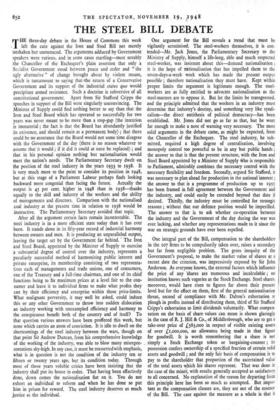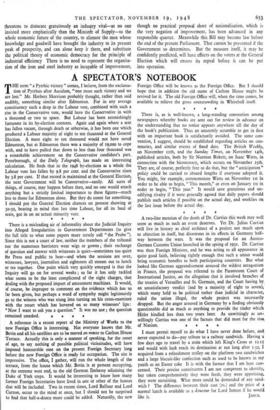THE STEEL BILL DEBATE
/17 HE three-day debate in the House of Commons this week I left the case against the Iron and Steel Bill not merely unshaken but unmenaced. The arguments adduced by Government speakers were various, and in some cases startling—most notably the Chancellor of the Exchequer's plain assertion that only a So:ialist Government stood between peace and order and " the ugly alternative " of change brought about by violent means, which is tantamount to saying that the return of a Conservative Government and its support of the industrial status quo would precipitate armed resistance. Such a doctrine is subversive of all constitutional government. Apart from Sir Stafford Cripps the speeches in support of the Bill were singularly unconvincing. The Minister of Supply could find nothing better to say than that the Iron and Steel Board which has operated so successfully for two years was never meant to be more than a stop-gap (the intention is immaterial ; the fact is that the Board has abundantly justified its existence, and should remain as a permanent body) ; that there could be no assurance that the Board would not some time disagree with the Government of the day (there is no reason whatever to assume that it would ; if it did it could at once be replaced) ; and that in his personal opinion nothing but nationalisation would meet the nation's needs. The Parliamentary Secretary dwelt on the position of the steel industry in the years 1933 to 1938. It is very much more to the point to consider its position in 1948, but at this stage of a Parliament Labour perhaps finds looking backward more congenial than facing the future. Actually the output is 45 per cent. higher in 1948 than in 1938—thanks equally to the skill and industry of the workers and the ability of managements and directors. Comparison with the nationalised coal industry at the present time in relation to 1938 would be instructive. The Parliamentary Secretary avoided that topic.
After all the argument certain facts remain incontestable. The steel industry is in a more efficient state today than it has ever been. It stands alone in its fifty-year record of industrial harmony between owners and men. It is producing an unparalleled output, leaving the target set by the Government far behind. The Iron and Steel Board, appointed by the Minister of Supply to exercise a substantial degree of control over the industry, represents a peculiarly successful method of harmonising public interest and private enterprise, its membership consisting of two representa- tives each of managements and trade unions, one of consumers, one of the Treasury and a full-time chairman, and one of its chief functions being to fix maximum prices at a level fair to the con- sumer and leave it to individual firms to make what profits they can by their efficiency and enterprise within those price-limits. What malignant perversity, it may well be asked, could induce this or any other Government to throw into sudden dislocation an industry working with unexampled efficiency and harmony to the conspicuous benefit both of the country and of itself? To that question various answers have been proffered this week, but none which carries an atom of conviction. It is idle to dwell on the shortcomings of the steel industry between the wars, though on that point Sir Andrew Duncan, from his comprehensive knowledge of the working of the industry, was able to blow many misrepre- sentations sky-high. In any case, it must be reasserted with emphasis, what is in question is not the condition of the industry ten or fifteen or twenty years ago, but its condition today. Through most of those years voluble critics have been insisting that the industry shall put its house in order. That having been effectively done, down comes the nationalisation fiat on it. You do not exhort an individual to reform and when he has done so put him in prison for reward. The steel industry deserves as much justice as the individual. One argument for the Bill reveals a trend that must be vigilantly scrutinised. The steel-workers themselves, it is con- tended—Mr. Jack Jones, the Parliamentary Secretary to the Ministry of Supply, himself a life-long, able and much respected steel-worker, was insistent about this—demand nationalisation ; it is the hope of nationalisation that has impelled them to the seven-days-a-week work which has made the present output possible ; therefore nationalisation they must have. Kept within proper limits the argument is legitimate enough. The steel- workers are as fully entitled to advocate nationalisation as the steel-masters are to oppose it. But let the limits be transgressed, and the principle admitted that the workers in an industry must determine that industry's destiny, and something very like syndi- calism—the direct antithesis of political democracy—has been established. Mr. Jones did not go as far as that, but he went far enough to make a note of warning very necessary. The most solid arguments in the debate came, as might be expected, from the Chancellor of the Exchequer. The steel industry, he sub- mitted, required a high degree of centralisation, involving monopoly control too powerful to be in any but public hands ; the answer to that is that the present structure, with the Iron and Steel Board appointed by a Minister of Supply who is responsible to Parliament, admirably combines the necessary control with the necessary flexibility and freedom. Secondly, argued Sir Stafford, it was necessary to plan ahead for production in the national interest ; the answer to that is a programme of production up to 1955 has been framed in full agreement between the Government and the industry, and could easily be extended beyond that date if desired. Thirdly, the industry must be controlled for strategic reasons ; without that our defence position would be imperilled. The answer to that is to ask whether co-operation between the industry and the Government of the day during the war was ever lacking, and whether any representations made to it since the war on strategic grounds have ever been repelled.
One integral part of the Bill, compensation to the shareholders in the 107 firms to be compulsorily taken over, raises a secondary but far from negligible problem. The gross inequity of the Government's proposal, to make the market value of shares at a recent date the criterion, was impressively exposed by Sir John Anderson. As everyone knows, the external factors which influence the price of any shares are numerous and incalculable ; no institution knows such vagaries as the Stock Exchange. Steel shares. moreover, would have risen to figures far above their present level but for the effect on them, first of the general nationalisation threat, second of compliance with Mr. Dalton's exhortation to plough in profits instead of distributing them, third of Sir Stafford Cripps's exhortation to limit dividends voluntarily. What compen- sation on the basis of share values can mean is shown glaringly in the case of R. J. Hill & Co., of Middlesbrough, who are to get a take-over price of £585,000 in respect of visible existing assets of over £1,000,000, no allowance being made in that figure for goodwill. It is worth remembering that a share is not simply a Stock Exchange token or bargaining-counter ; its possession confers ownership of a specified fraction of certain solid assets and goodwill ; and the only fair basis of compensation is to pay to the shareholder that proportion of the ascertained value of the total assets which his shares represent. That was done in the case of the mines, with results generally accepted as satisfactory to all concerned. No explanation of the reason for departing from this principle here has been so much as attempted. But impor- tant as the compensation clauses are, they are not of the essence of the Bill. The case against the measure as a whole is that it threatens to dislocate gratuitously an industry vital—as no one insisted more emphatically than the Minister of Supply—to the whole economic future of the country, to alienate the men whose knowledge and goodwill have brought the industry to its present peak of prosperity, and can alone keep it there, and substitute the political theory of economic democracy for the principle of industrial efficiency There is no need to represent the organisa- tion of the iron and steel industry as incapable of improvement, though no practical proposal short of nationalisation, which is the very negation of improvement, has been advanced in any responsible quarter. Meanwhile this Bill may become law before the end of the present Parliament. That cannot be prevented if the Government so determines. But the measure itself, it may be confidently predicted, will have effects on the voters at the General Election which will ensure its repeal before it can be put into operation.



































 Previous page
Previous page